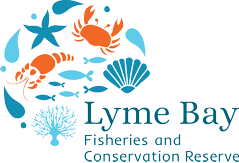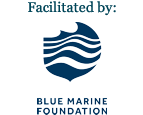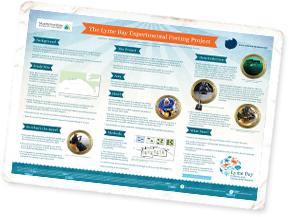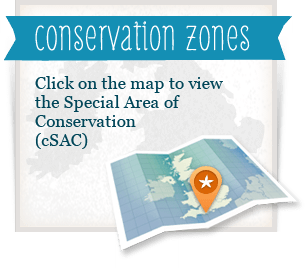
2013 News
Improving the catch quality on inshore vessels28th November, 2013
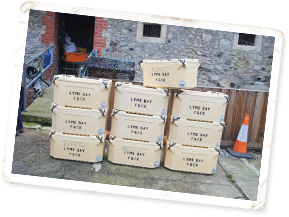
The first delivery of the insulated fish boxes was delivered to Beer fishermen of the Lyme Bay Fisheries and Conservation Reserve this week.
Beer is the first of 4 ports to receive these boxes as part of the scheme to enhance quality and support the launch of a brand next year.
The fishermen will take the insulated boxes onboard their boats as an immediate step to keep their fish iced. These include two boxes – one for slushed-ice to reduce core temperature quickly and the other filled with ice to keep the fish cool. Slushed-ice is crucial to reduce the core temperature of fish as soon as they are caught. This will increased their shelf-life and therefore their marketability.
ITV Westcountry News, who have been following the Lyme Bay Fisheries and Conservation Reserve since the start came down to film the incentive. Fisherman Jim Newton was filmed with Gus Caslake from Seafish showing him how to use the fish boxes onboard his boat whilst out fishing.
To watch the news item, head over to: http://www.itv.com/news/westcountry/2013-11-28/new-scheme-to-improve-catch-quality/
![]() European Commission Workshop, Vilnius, Lithuania.
European Commission Workshop, Vilnius, Lithuania.
15th November, 2013
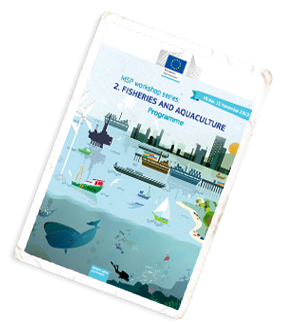
Tim Glover, Chair of the Lyme Bay Fisheries and Conservation Reserve was invited to present the Lyme Bay project at a European Commission workshop in Vilnius, Lithuania as the project is regarded to be an excellent case of spatial co-management of marine resources/area.
The workshop was dedicated to fisheries and aquaculture and gathered experts, industries and NGOs to discuss the coexistence and synergies between fisheries, aquaculture and other maritime sectors in a context of increasing use of marine space. It also focused on the management of competition and co-existence, on data needs for maritime planning of fisheries and aquaculture activities, and on the particularities of cross-border planning.
For further information visit: www.amiando.com/MSPworkshops_Vilnius.html
Full workshop programme can be seen here.
![]() 3rd International Marine Protected Areas Congress - Marseille, France
3rd International Marine Protected Areas Congress - Marseille, France
18th October, 2013
Adam Rees and the Plymouth University Marine Institute attended the 3rd International Marine Protected Areas Congress in Marseille, France presenting a poster on the Lyme Bay Experimental Potting Project and co-chaired a talk about 'Using local knowledge in MPA management' where he presented the project as an example of scientists and fishermen working together to achieve a positive outcome.
![]() BBC2's Escape to the Country
BBC2's Escape to the Country
14th October, 2013
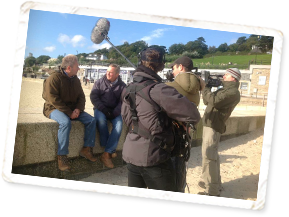
BBC2's Escape to the Country were filming in Lyme Regis and the Lyme Bay Fisheries and Conservation Reserve were invited to film a piece for the forthcoming episode.
Presenter Jules Hudson told Lyme Bay project coordinator Neville Copperthwaite that they were keen to film a piece on the Lyme Bay project because it is current and will still be current when the episode is screened in three months time. This will make their program more interesting to viewers.
Jules also told Neville that the series is usually repeated and it is also now sold internationally therefore providing lots of good coverage for BLUE Marine Foundation as Facilitators of the Lyme Bay project as well as for the Lyme Bay Fisheries and Conservation Reserve itself. It is an opportunity for the general public to hear about how this solution could be used by government to manage future marine protected areas in a better way.
![]() Launch of Southern IFCA vessel 'Protector'
Launch of Southern IFCA vessel 'Protector'
8th October, 2013
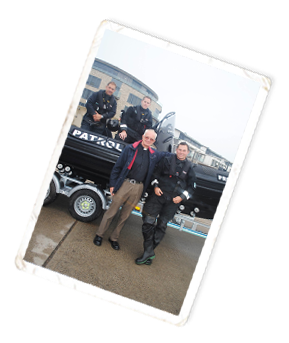
An early start saw the blessing of the new Southern IFCA vessel 'Protector' in West Bay before setting out on her maiden enforcement voyage.
The Reverend Philip Ringer, Chairman of Churches Together in Bridport & District conducted the blessing which was swiftly followed by the boats launch into the Bay.
The new RIB vessel will be used to protect the coastal seas in the region which are some of the most diverse and productive in the country which in turn support one of the largest coastal fishing fleets in England as well as providing many important recreational benefits to the thousands of anglers who enjoy their sport off these shores.
The new RIB will support and develop Southern IFCAs partnership with other public authorities that are involved with research, monitoring, regulation or enforcement in the sea within the region.
![]() Catch It, Cook It, Eat it! - Chefs' Forum Event, West Bay
Catch It, Cook It, Eat it! - Chefs' Forum Event, West Bay
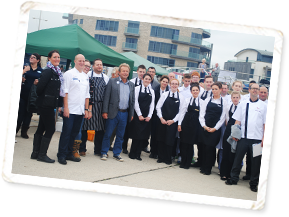
Top Dorset chefs, the Lyme Bay Fisheries and Conservation Reserve and local fishermen gathered on the sunny Old Pier at West Bay yesterday for Catch It, Cook It Eat It' organised by The Chefs' Forum. Highlights of the day included fish filleting contests amongst professional chefs and catering students, insightful question and answer sessions with the Lyme Bay Fisheries and Conservation Reserve and fish cookery demos made for a very interesting day!
Bournemouth and Poole College has just been awarded The World Association of Chefs Societies (WACS), a global network of top cooks, has recognised the college’s culinary education programme, labelling it one of the best 20 in the world. Students from this fantastic education facility helped cater and serve at the 'Catch It, Cook It, Eat It' event to a tough audience of future employers.
The young chefs and hospitality professionals really enjoyed the day and Btec Level 3 Hospitality Student Jess Burbidge (17) won a top of the range set of chefs' knives by Edge of Belgravia for scooping first place in the 'Fastest Forum Filleter' student heat.
Chefs' Forum Committee member Brett Sutton (Eastbury Hotel) won the Professional heat of the fish filleting contest... and a prize of an induction hob from Control Induction. He said: "I was very impressed with the students' knife skills and am looking forward to having them work in my busy kitchen one day!
Local veteran Fisherman Dave Sales talked to the group of chefs about the work of the Lyme Bay Fisheries and Conservation Reserve and how it benefits him in preventing large commercial fishing fleets from desecrating the waters. Neville Copperthwaite, spokesman for the Lyme Bay Fisheries and Conservation Reserve said: “There are over 40 species of fish in Lyme Bay. One of the aims of the project is to get the best price for the fish they catch whilst protecting the sea bed and conserving nature”.
Matt Budden, Head Chef at the High Cliff Grill, Bournemouth stated: It was good to see students engaging with the fishing community so that they can gain a better understanding of sustainable fishing. Lyme Bay Fisheries and Conservation Reserve is an invaluable tool for chefs to use as a resource for menu development.
Christophe Baffos, Head of Hospitality & Tourism (Bournemouth & Poole College) said: "We as a College are looking to improve our links with Dorset employers in the catering industry and The Chefs' Forum is a perfect vehicle to do this. Chefs' Forum events help us to keep in touch with industry and improve communication with professional kitchens on a local level".
The Chefs' Forum launched two years ago and has since expanded to include highly accredited chefs, catering colleges and top suppliers on a South West and South East regional level. Catherine Farinha, Founder of The Chefs' Forum and event organiser stated: "We have forged valuable links between the catering colleges and top chefs across the South of the UK and it is wonderful to stage another event in Dorset. This event brought top chefs and students together with local fishermen. Our events are a great opportunity next generation of top chefs and Front of House professionals learning from the very best in the business".
The Chefs' Forum plans to roll-out nationally next year working with prestigious industry organisations to facilitate this. www.thechefsforum.co.uk
![]() A successful day at the BLUE Marine Foundation conference on Managing Marine Protected Areas.
A successful day at the BLUE Marine Foundation conference on Managing Marine Protected Areas.
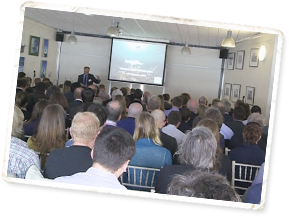
The Lyme Bay Fisheries and Conservation Reserve were delighted to be part of the BLUE Marine Foundation conference on Managing Marine Protected Areas, which was held at the Weymouth and Portland National Sailing Academy on Wednesday 18th September.
The fully subscribed conference attracted over 150 attendees representing conservation, science and marine authority, along with fishermen from the ports of Lyme Bay. Charles Clover, Chairman of Blue Marine Foundation started proceedings followed by Nigel Gooding from Defra presenting his keynote speech on 'Managing marine protected areas - is the law up the task?'. Working Group members of the Lyme Bay Fisheries and Conservation Reserve presented the project's objectives and achievements to date.
The conference saw lots of energy in the room and a healthy debate throughout the day about the future of marine protected areas and heard from fisheries from other parts of the country.Those who were unable to secure a place at the conference were able to follow the days agenda virally via twitter using the hashtag #MPAConf2013, which was a resounding success.
ITV Westcountry News were also there filming, who have been on board with the Lyme Bay Reserve project from the outset. The report can be seen here: http://www.itv.com/news/westcountry/update/2013-09-19/fishermen-and-conservationists-build-sustainable-future/
The day ended with a local seafood demonstration by the chef, restauranteur and food writer Mark Hix watch by attendees of the conference who then samples some of the wonderful, sustainably caught, seasonal seafood from our seas.
![]() Survey of a candidate Special Area of Conservation, Lyme Bay
Survey of a candidate Special Area of Conservation, Lyme Bay
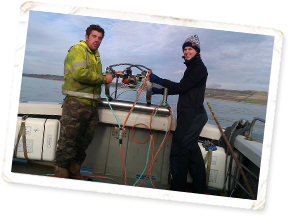
Recently some of our fishermen were involved in doing underwater video surveys with Seafish and Plymouth Uni students.
Planning the survey involved fishermen working with PhD students at Plymouth University and staff from Southern IFCA, Devon & Severn IFCA and Natural England. Survey sites were determined following discussions with Southern IFCA and Natural England who identified areas in the east of the cSAC where confidence in reef data was low. Twelve sites were planned, six within an area open to fishers using bottom towed gear who were participating in the iVMS trial, and six in an adjacent sensitive reef area.
A total of 12 video stations were worked recording in excess of 2 hours of seabed footage over the 2 days of survey. Basic analysis has been conducted, with more detailed analysis to be completed at a later date by Plymouth University students.
Photo credit: Seafish.
Plymouth University Potting Study
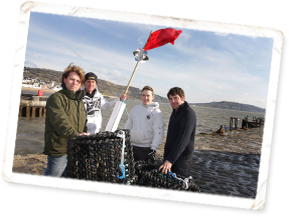
Last week saw the first pots being made up into strings, ready for the first bout of sampling. The sampling programme, which is a 3 year novel experiment by Plymouth University aims to assess the impact of static gear, such as potting, within the Lyme Bay Marine Protected Area.
The programme also aims to provide evidence that the sustainable, low level potting occurring in Lyme Bay does not have a significant impact on the environment and to determine a level at which potting starts to become unsustainable. You can read more about the Potting Study here.
Fish Tagging Workshop
A Quality,Traceability and Sustainability Workshop was held on the 19th of February as a result of previous invitation by the Environmental Defence Fund (EDF) for three of our Working Group members to visit America to see first-hand how their Gulf Wild fish Tagging Scheme works in the gulf of Mexico.
The visit was filmed and interest generated back here in Britain to see whether the Gulf Wild Scheme could be adapted for the Lyme Bay area. EDF offered to host the workshop to establish if there was an appetite for a tagging scheme and to explore the practicalities of implementing a scheme.
The workshop was well attended by over 50 people including Lyme Bay fishermen, fish market auctioneers and fish buyers as well as observers from SeaFish, the Prince's Trust International Sustainability Unit and other NGO's.
Tim Fitzgerald of EDF explained how tagging & bar-coding using QR codes provide unique tagging system and allows for the consumer/ buyer to trace where their fish has come from, down to the vessel and the captain of the vessel. When the QR code is looked up by a consumer it also enables you to look at where the fish has ended up. This has potential value in the long term for the Lyme Bay project. It can provide real, visual evidence of where Lyme Bay products are ending up, on a local scale but also more broadly within the UK- tying in with emphasis on using locally sourced products.
However, the Gulf Wild type of tagging using plastic tags and air-pressure "guns" was viewed as being not wholly appropriate to the type of fisheries in Lyme Bay but the principle of establishing a traceability system was well supported.
Dave and Alison Pessell of Plymouth Trawler Agents advised that in order to achieve quality, the ports of Lyme Bay would need to invest in basic ice facilities. The message was loud and clear: we need to work on quality as well as traceability and sustainability if Lyme Bay fishermen are going to get the best price for their catch .
In Summary, the workshop concluded that buyers rate the quality of seafood as paramount. Auctioneers said Lyme Bay ports could get a premium for their fish immediately, provided fish was of high quality and traceable to the vessel as coming from Lyme Bay. With a system of traceability and proof of sustainability - in addition to one for quality control - fishermen from Lyme Bay would be able fully to maximise the price for their catch. The workshop heard that Marriott hotels now rank price of second or third importance compared with traceability and sustainability when buying fish - provided quality is high.
The workshop initiated a plan for raising the quality of fish landed in four Lyme Bay ports by investigating the possibility of EFF funding for the installation of ice facilities within the four ports.
![]()

